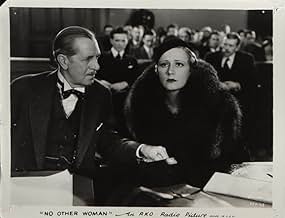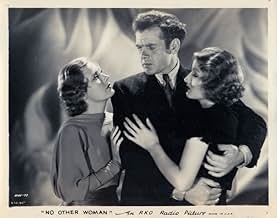Ajouter une intrigue dans votre langueA steelworker and his aspiring wife make millions when they become partners in a dyeworks. Unfortunately, success does not bring happiness.A steelworker and his aspiring wife make millions when they become partners in a dyeworks. Unfortunately, success does not bring happiness.A steelworker and his aspiring wife make millions when they become partners in a dyeworks. Unfortunately, success does not bring happiness.
- Réalisation
- Scénario
- Casting principal
- Récompenses
- 1 victoire au total
Theodore von Eltz
- Sutherland
- (as Theodore Von Eltz)
Jules Cowles
- Boarder
- (non crédité)
Phyllis Fraser
- Minor Role
- (non crédité)
Arthur Hoyt
- Bridge Player
- (non crédité)
Mary Mason
- Minor Role
- (non crédité)
Avis à la une
Irene Dunne was the unquestionable queen of the thirties melodrama ;even when the story is mawkish to a fault, so over the top ,she saves the situation .
A model of a housewife, who helps her husband she cherishes and a young chemist to achieve their American dream,that is to say a dyer workers affair ;very soon (too soon maybe , but the movies were short at the time,being often part of a double-feature),they find themselves thrust to the high society and to a world of luxury.
Miss Dunne,in spite of her fortune,has remained a virtuous lady and she would give it all so as not to be denied the custody of her only child ; the trial would make the movie become thoroughly ridiculous, if it weren't for the actress ' performance, who in her final plea when she's prepared to take all the blame, will win you over; have your box of kleenex besides you.
A model of a housewife, who helps her husband she cherishes and a young chemist to achieve their American dream,that is to say a dyer workers affair ;very soon (too soon maybe , but the movies were short at the time,being often part of a double-feature),they find themselves thrust to the high society and to a world of luxury.
Miss Dunne,in spite of her fortune,has remained a virtuous lady and she would give it all so as not to be denied the custody of her only child ; the trial would make the movie become thoroughly ridiculous, if it weren't for the actress ' performance, who in her final plea when she's prepared to take all the blame, will win you over; have your box of kleenex besides you.
Steel mill worker's daughter Irene Dunne marries mill hand Charles Bickford. He eventually becomes a rich owner of a dye works and takes on New York mistress Gwili Andre. When Miss Andre insists on marriage and Miss Dunne refuses him a divorce, witnesses lie that she is the one having an affair.
It looks as ifthis movie had been more ambitious at one point; certainly, the marriage reception, which looks very Polish, shows the attention to detail that director J. Walter Ruben liked to take. But its short length -- impelled by Slavko Vorkapich's transitional montages -- keep it too brisk for anyone to get any real flavor out of its bite-sized portions. With Eric Linden, Christian Rub, Leila Bennet, and J. Carrol Naish.
It looks as ifthis movie had been more ambitious at one point; certainly, the marriage reception, which looks very Polish, shows the attention to detail that director J. Walter Ruben liked to take. But its short length -- impelled by Slavko Vorkapich's transitional montages -- keep it too brisk for anyone to get any real flavor out of its bite-sized portions. With Eric Linden, Christian Rub, Leila Bennet, and J. Carrol Naish.
No Other Woman is sure one misnomer of a title. This rather dated soap opera
has Charles Bickford caught between two of them.
First there's Irene Dunne, his wife who saw him through the lean years as he starts a new steel business with young chemist Eric Linden and bore his son Buster Miles. But Bickford never quite changed his partying ways and now that he's rich he carouses on a grander scale.
Enter Gwili Andre a slinky society minx who gets his mojo going and when Bickford's libido is aroused he's obeying what's coming from below decks.
Given the liberalization of divorce laws now, this film is quaintly old fashioned and a lot of younger viewers might not understand what's going on. But back in the day you had to prove allegations made in court and a lot of dirty linen got exposed. Then as now a lot of shaky allegations were made.
Irene Dunne is the noble wife who is ready to defend home and hearth from the intruder in court or anywhere else. A most typical role for her. The climax is the divorce case brought on by Bickford and his lawyer J. Carrol Naish. Naish really steals the film in the end as the kind of shyster that lawyer jokes are made out.
No Other Woman is dated and quaint, but still good entertainment.
First there's Irene Dunne, his wife who saw him through the lean years as he starts a new steel business with young chemist Eric Linden and bore his son Buster Miles. But Bickford never quite changed his partying ways and now that he's rich he carouses on a grander scale.
Enter Gwili Andre a slinky society minx who gets his mojo going and when Bickford's libido is aroused he's obeying what's coming from below decks.
Given the liberalization of divorce laws now, this film is quaintly old fashioned and a lot of younger viewers might not understand what's going on. But back in the day you had to prove allegations made in court and a lot of dirty linen got exposed. Then as now a lot of shaky allegations were made.
Irene Dunne is the noble wife who is ready to defend home and hearth from the intruder in court or anywhere else. A most typical role for her. The climax is the divorce case brought on by Bickford and his lawyer J. Carrol Naish. Naish really steals the film in the end as the kind of shyster that lawyer jokes are made out.
No Other Woman is dated and quaint, but still good entertainment.
Irene Dunne stars as a factory-town woman who wants a better life (like Barbara Stanwyck in Stella Dallas, Katharine Hepburn in Alice Adams and Joan Crawford in Possessed). She's in love with factory worker Charles Bickford. They marry and she runs a boarding house to make extra money. One of the boarders is a shy immigrant (Eric Linden) who has discovered a great new dye. Dunne talks Bickford into throwing in their savings and open a dye works. They become rich. But Bickford travels a lot and falls into the clutches of a bad woman (Gwili Andre) who wants more than money: marriage.
The court room finale is a doozy with J. Carroll Naish playing a sleazy (Italian in this case) lawyer who has cooked up a scheme to get his girl friend (Andre) married to Bickford. So they line up a bunch of false witnesses against Dunne. But Dunne turns the tables when they try to grab custody of the baby as well. Excellent plot twist.
Dunne is one of the greats, and she's terrific here too. She's even believable as a factory-town girl. Bickford is an acquired taste and I never liked him as a "leading man." Linden is good is his usual "soft" role. And Naish is always fun to hate. Leila Bennett, Hilda Vaughn, and Christian Rub co-star.
No Other Woman is famous as the film that derailed Danish Gwili Andre's career because her character is so nasty. She battled for another decade to regain a foothold in films but only landed small parts. She committed suicide in 1959 by surrounding herself with publicity photos and press clippings and setting them and herself on fire.
The court room finale is a doozy with J. Carroll Naish playing a sleazy (Italian in this case) lawyer who has cooked up a scheme to get his girl friend (Andre) married to Bickford. So they line up a bunch of false witnesses against Dunne. But Dunne turns the tables when they try to grab custody of the baby as well. Excellent plot twist.
Dunne is one of the greats, and she's terrific here too. She's even believable as a factory-town girl. Bickford is an acquired taste and I never liked him as a "leading man." Linden is good is his usual "soft" role. And Naish is always fun to hate. Leila Bennett, Hilda Vaughn, and Christian Rub co-star.
No Other Woman is famous as the film that derailed Danish Gwili Andre's career because her character is so nasty. She battled for another decade to regain a foothold in films but only landed small parts. She committed suicide in 1959 by surrounding herself with publicity photos and press clippings and setting them and herself on fire.
I saw(?) this flick once before on the tube, but the reception on the station was so bad, I had to wait for it to come on again. It was a good wait, but it came around again. Irene Dunne and Charles Bickford were probably the only ones around who could'a pulled this one off. Bickford works at the mill, marries Dunne, works hard for the money, but somehow is just not satisfied with life. He's a lucky stiff though, as Irene Dunne-- as was wont of wives in those days--stuck with him through the thick and the thin of it. What is more incredulous is the rags to riches to rags aspect of this film. Bickford finances a new type of dye developed by the young upstart living in the family boarding house, and becomes a millionaire in the process. Yeah...right !! Still more incredulous--if not audacious--is the court scene where a very nasty divorce takes place, replete with witnesses who have been 'greased' to render perjured testimony...the whole nine yards. Bickford flies too close to the Sun with wings made of wax and...you can fairly well imagine the rest. It could'a worked, if the story had been a bit more developed, and if the film had been somewhat longer. This was essentially a character study which failed to study its characters with any depth.
Le saviez-vous
- AnecdotesAt the wedding reception, guest are seen pinning money on Anna's dress before dancing with her. This was a common practice in Polish immigrant communities and was called the "money dance." Sometimes the bride wears an apron or carries a purse in which to place the money. The purpose of the money is for the couple's honeymoon, to set up housekeeping, or for the couple's first-born child.
- GaffesThe shadow of the camera can be seen falling on people at the wedding as it moves around the room.
- Citations
Anna Stanley: To your dying day, you'll work in the mill.
Jim Stanley: Sure! Why not?
Anna Stanley: Like your father did, and mine. And your children will go on doing the same thing, and their children...
Jim Stanley: Hey - what is all this tripe?
- ConnexionsRemake of Just a Woman (1925)
Meilleurs choix
Connectez-vous pour évaluer et suivre la liste de favoris afin de recevoir des recommandations personnalisées
Détails
- Date de sortie
- Pays d’origine
- Langue
- Aussi connu sous le nom de
- No Other Woman
- Lieux de tournage
- Birmingham, Alabama, États-Unis(TCI Ensley Works - steel mill exteriors after wedding reception)
- Société de production
- Voir plus de crédits d'entreprise sur IMDbPro
- Durée
- 58min
- Couleur
- Rapport de forme
- 1.37 : 1
Contribuer à cette page
Suggérer une modification ou ajouter du contenu manquant





































